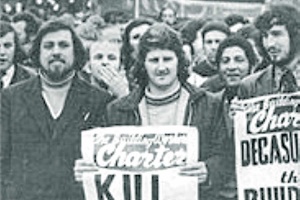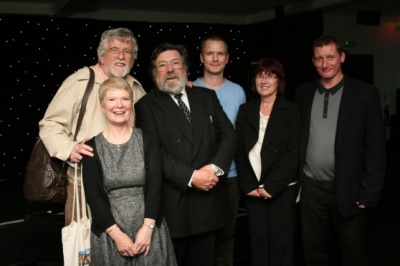Shrewsbury 24
 | |
| Formation | 6 September 1972 |
| Interest of | Laurie Flynn |
| Membership | • Kevin Butcher • John Carpenter • Malcolm Clee • Gary Davies • Bill Hooson • Derrick Hughes • Alfred James • John Mckinsie Jones • John Elfyn Llywarch • Dennis Morris • George Arthur Murray • Kenneth O’Shea • Mike Pierce • Terry Renshaw • Graham Roberts • Peter Sear • John Seaburg • Bryn Thomas • Ricky Tomlinson • Roy Warburton • Des Warren • Brian Williams • Edward Williams • Tom Williams |
| Labour is threatening to oppose Tory government plans to extend spying powers unless it releases papers about the "politically motivated show trial" of the Shrewsbury 24 in the 1970s. | |
The Shrewsbury 24 were trade union members working in the construction industry who sought to persuade their non-unionised colleagues to join the 1972 building workers' strike for better pay and conditions, by picketing building sites in and around Shrewsbury, Shropshire.[1] Twenty four of the pickets were charged under the 1875 Conspiracy Act, tried and convicted of intimidation and six were jailed.[2]
Contents
Overturning the conviction

The Shrewsbury 24 Campaign supported by trade unions, MPs, journalists and members of the public seeks to overturn the conviction. TV star Ricky Tomlinson, who spent 16 months in jail, says:
- "I speak not just for myself but also for all the pickets who were charged. Many of them never worked again due to the blacklist, in particular Des Warren who died in 2004. The prison sentences and fines we received for picketing completely wrecked our lives. The Official Shrewsbury 24 Campaign Committee have carried out extensive research into this miscarriage of justice and are confident that our application to the Criminal Cases Review Commission has a good chance of being considered favourably and referred to the Court Of Appeal, where we hope the convictions will be quashed. I thank them from the bottom of my heart for all their efforts. Please support our campaign."[3]
In December 2013, more than 100,000 people signed a petition calling to clear the names of the Shrewsbury 24.[4]
Releasing the papers
In a speech to the Labour Party conference in September 2015, Shadow Home Secretary Andy Burnham called for the "full story" of the arrests of the Shrewsbury 24 to be laid bare. Burnham, who successfully campaigned for the Hillsborough Inquiry, said:
- "In recent years, we have learnt more about how we were governed in the 20th Century. What we know isn't good but we still don't know it all. We don't know the full extent of the collusion between senior police and press and that's why the second inquiry recommended by Lord Leveson must go ahead. We won't know the full story of Hillsborough until we know what the same police force did to the miners in the aftermath of Orgreave. And to understand how an anti-trade union culture developed in parts of our police in the past, we need the full story about the false convictions and imprisonment of building workers in Shrewsbury. I will make it my personal priority in this job to put the pieces of this jigsaw together - alongside other historical injustices we have seen - child sexual abuse and exploitation, the blacklisting of workers, the abuse of stop and search powers against black and Asian young people. No more delay - give us the full truth about Shrewsbury, give us the full truth about Orgreave, justice demands it. We can only build a more equal society in this century when we know about the injustices of the last."[5]
Westminster Hall debate
On 9 December 2015, Steve Rotheram MP Parliamentary Private Secretary to Labour leader Jeremy Corbyn, sponsored a debate in Westminster Hall concerning the lack of transparency regarding the Conservative government. He emphasised the age of the pickets and the need for no further delay in releasing the papers, and allow the pickets to receive the justice they deserve.[6] Andy Burnham, Shadow Home Secretary, threatened to oppose Theresa May's plans to extend spying powers under the Draft Investigatory Powers Bill (which aims to overhaul the laws governing how the state, police and spies can gather private communications or other forms of data to combat crime, "terrorism" and other threats to national security) unless it releases papers about the "politically motivated show trial" of the Shrewsbury 24. Burnham alleged that the men were victims of a propaganda war, and there was undue political influence "at the very top of government" over the decision to prosecute them. He said:
- "What possible justification can there be, 43 years on, for information about it to be withheld on national security grounds? The failure to disclose has less to do with national security and much more to do with the potential for political embarrassment."[7]
Replying to the debate, Minister of State for Policing and Justice Mike Penning said files relating to the investigation and conviction of the Shrewsbury 24 could not be released on the grounds of "national security".[8]
Appeal Court hearing
On 3 February 2021, the surviving Shrewsbury 24 pickets fought to clear their name in a two-day hearing at the Court of Appeal after they were criminalised for going out on strike in 1972. Unite general secretary Len McCluskey said:
- “The deep injustices perpetrated against working people by the state, including the Shrewsbury pickets, have been, quite simply, criminal.
- “I’ve been so proud of all Unite has done throughout the nearly 50 years of the campaign to support the 24 in their fight for justice. Today, the truth must be heard.”[9]
Lawyers for the trade unionists, including the actor Ricky Tomlinson, told the court that the “higher echelons of the state” were responsible for helping to get them unfairly convicted for offences arising out of a strike 49 years ago.
Tomlinson, then working in the building trade, was one of six men jailed after the 1972 strike. After his two-year jail sentence he left the construction industry having been blacklisted, and became a successful actor.
Piers Marquis, the barrister for Tomlinson and another trade unionist, Arthur Murray, said the covert agencies gave a dossier on leftwing trade unionists to the makers of a “highly prejudicial” television programme that was broadcast in 1973 during one of the three trials of the men.
He told Lord Justice Fulford that the ITV programme – called "Red Under the Bed" – unfairly influenced jurors when they decided to convict the men.
Marquis described how a secretive unit within the Foreign Office, the Information Research Department (IRD), “played a significant part in the production of the programme”.
The IRD was a Cold War unit that spread anti-communist propaganda throughout the world. “Part of its remit was to provide anti-communist material to journalists for broadcast and dissemination,” he said.
Marquis cited a memo from the head of the IRD who wrote “we had a discreet but considerable hand in the programme”, which was made by Woodrow Wyatt, a rightwing journalist.
“Wyatt was given a large dossier of IRD background material with the agreement of the Department of Employment and the Security Service … It is clear from the programme that Mr Wyatt drew extensively on that material,” he said.
He cited another official memo which showed that the then prime minister, Edward Heath, had commented after being shown a transcript of the programme: “We want as much as possible of this.”
According to prosecutors in the original trials, the trade unionists intimidated other workers during the strike. Marquis said the programme sought to suggest that leftwing activists manipulated trade unions and used violence.
He said the programme clearly referred to the defendants and associated them “firstly with communism and subsequently with the overthrow of the state by means of violence”.
Marquis said: “At least three branches of government (the IRD, as part of the Foreign and Commonwealth Office, the Department of Employment and the Security Service) provided material to Woodrow Wyatt that directly impacted on the subject matter of high-profile and politically important criminal proceedings.”[10]
Related Quotation
| Page | Quote | Author | Date |
|---|---|---|---|
| "National security" | “What possible justification can there be, 43 years on, for information about it [the trial of the Shrewsbury 24], to be withheld on national security grounds? The failure to disclose has less to do with national security and much more to do with the potential for political embarrassment.” | Andy Burnham | 2015 |
Known members
3 of the 24 of the members already have pages here:
| Member | Description |
|---|---|
| Ricky Tomlinson | |
| Des Warren | Together with Ricky Tomlinson, Des Warren received the stiffest sentences of the Shrewsbury 24. |
| Brian Williams | Corporate journalist nominated for fake news award |
Related Document
| Title | Type | Publication date | Author(s) | Description |
|---|---|---|---|---|
| Document:Government conspiracy against 1972 UK builders’ strike exposed | Article | 15 December 2015 | Barry Mason | On 3 February 2021, the surviving Shrewsbury 24 pickets fought to clear their name in a two-day hearing at the Court of Appeal after they were criminalised for going out on strike in 1972. |
References
- ↑ "Government conspiracy against 1972 UK builders’ strike exposed"
- ↑ "Picketing At Shrewsbury"
- ↑ "Pickets' statements"
- ↑ "Shrewsbury 24 pickets petition signed by 100,000"
- ↑ "Burnham calls for release of papers on the 'Shrewsbury 24'"
- ↑ "Westminster Hall Debate: Home Office and the case of the Shrewsbury 24"
- ↑ "Shrewsbury 24: Labour threat over spying powers bill"
- ↑ "Shrewsbury 24: Government rejects calls to release files"
- ↑ "Trade unions send solidarity to Shrewsbury 24 as they head to court to clear the names"
- ↑ "MI5 was involved in 1972 conviction of trade unionists, court told"